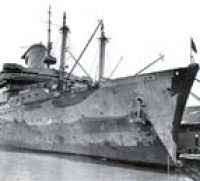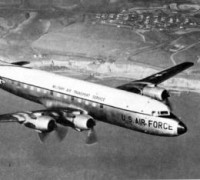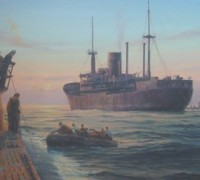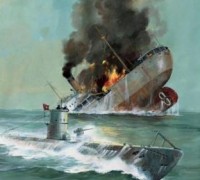- COMMANDER SOUTH ATLANTIC
32)HIGHLIGHTS OF 1944
By the beginning of 1944 the Fourth Fleet establishments in Brazil had reached the stage of stabilization. Personnel had attained its maximum size and most of the construction was over. Some further enlargement of the Lighter-than-Air branch took place, involving additional building, chiefly in Southern Brazil. Much improvement of prior construction also went on. But the period of growth had ended. Moreover, the Brazilians had now reached a point of proficiency, both on sea and in the air, which enabled them to do a great deal of the convoy and patrol work formerly performed by Americans.
With the capture of the blockade runners in January, every reasonable indication existed that the battle of the South Atlantic had been won. From then on, although U-Boats appeared at intervals, the intervals became rarer. Finally, the Allied invasion of Continental Europe, commencing in June, soon wrested from the Nazis the western French ports on which so many of their subs had been based. As 1944 swung into its last quarter, the Mediterranean, France, Belgium, and part of Holland, had been liberated. It thus became almost a certainty that Germany, no matter how long she might postpone her day of collapse, could no longer send submarines to a theater as distant as the South Atlantic.
On the other hand, the uncertain actions of Argentina, with her well known Axis leanings, acted as a deterrent to any too-hasty withdrawal of the Fourth Fleet. Since operations have been covered for 1944, in the previous chapter, the present one will be devoted to an enumeration of events of outstanding interest that took place during the year.
In March several of the Brazilian Facilities received a visit from Mrs. Roosevelt. The First Lady began her excursion with a flight through the Caribbean, where she stopped at several Army and Navy stations. Her first Brazilian stop was at Pelem, where she was met by Rear Admiral Read, representing the Commander Fourth Fleet, and General Walsh, Commanding General USAFSA. During her busy tour Mrs. Roosevelt attended several social functions given for her by high-ranking officers, but she described her chief purpose as that of seeing as many enlisted men as possible and telling them that their work was important.
At Natal the First Lady presented awards to 30 officers and men of the Navy Bombing Squadron stationed there, for excellent work in combating enemy submarines and blockade runners. At Recife she visited all the activities in the vicinity, and at each one spoke briefly to the assembled officers and men. She brought a message direct from the President, expressing appreciation for the excellent work done by the Fleet in the South Atlantic. Mrs. Roosevelt did not proceed south of Recife, but returned immediately to the United States via the West Indies.
Early in the following month, the Admiral's Chief-of-Staff, Captain Braine, learned of his advancement to the rank of Commodore dating from March 31. On that day the Chiefs-of-Staff of several Navy fleets and shore commands were awarded the one star. The rank of Commodore, though once dropped by the U. S. Navy for officers of the active list, had been reestablished during 1943. Commodore Braine was the first of his rank to be seen in the South Atlantic, though a few weeks later Captain Dodd, head of the Naval Mission at Rio, received the same promotion. Earlier in the month of April, Vice Admiral Ingram received from Secretary Knox the "Distinguished Service Medal" for his contributions to the Allied cause. This award incidentally, was one of the last acts of the Secretary of the Navy's career, as he died a few days later. Presentation of the medal took place on April 27, at a staff conference, with Commodore Braine acting temporarily as the representative of the Commander-in-Chief, U. S. Atlantic Fleet, and making the bestowal.
"All of you share this honor," said the Admiral to those about him as he received the medal. He went on to state that the award was the result of the combined efforts of all the personnel of the Fleet. Because many of the achievements for which the Admiral won the DSM were still of confidential nature the citation read by Commodore Braine was the "non-classified" one; the permanent citation being held for the time being in the Navy Department in Washington. The award made the Admiral the holder of the three highest Navy decorations, he already having won the Congressional Medal of Honor, for conspicuous action at Vera Cruz in 1914, and the Navy Cross. During his stay in South America, he acquired two high Brazilian decorations; those of Grand Commander of the Southern Cross, and the Ordem do Merito Naval. Commodore Braine also received the Brazilian Southern Cross decoration in June.
Commander Gene Tunney visited the South Atlantic area in the latter part of June. The Commander, who held the world's heavyweight boxing championship from 1926 to 1928, came to the Fourth Fleet Area to inspect the physical training program and facilities. As director of physical training for the entire Navy, Commander Tunney made this tour with a view of getting the men of the Fleet into shape for arduous duties they might later be called upon to perform in other areas. In visiting Recife, the Commander arrived just in time for a boxing smoker. He acted as referee for some of the bouts and made a speech to the assembled spectators, the theme of which was "keep fit and above all learn to swim." Commander Tunney, accompanied by Lieutenant Commander McCoy, Fleet Athletic Officer, was the recommendation that more athletic specialists be assigned to the area to assist in the sports program.
On the first day of August, the Brazilian Navy received two Destroyer Escort ships from the Fourth Fleet. The USS Pennewill and the USS Herzog became the Brazilian Naval vessels Bertioga and Beberibe. The transfer was the occasion for a presentation ceremony at Natal, where the exchange took place, attended by U. S. and Brazilian officials. Admiral Ingram made a speech presenting the ships and Rear Admiral Parreiras, Director of the Natal Naval Base, accepted on behalf of his government. Both speakers stressed the idea of Brazilian-American solidarity, and Admiral Parreiras gave assurance that the Brazilian sailors about to man the vessels would endeavor to become worthy of their predecessors. The program was enlivened by music of the Fourth Fleet Band. As the ceremony began, both ships were tied on opposite sides of a pier, with the stars and stripes still flying and an honor guard aboard.
Each American commanding officer read the orders decommissioning his ship, and the American flags came down. At this point the two Admirals made their speeches of presentation and reception. The Brazilian Flag Secretary then read orders to commission the ships in his country's Navy. The Fourth Fleet Band broke into the Brazilian Navy March and the new crews marched aboard the Bertioga and Beberibe.
The new officers, on taking over, found awaiting them two engraved silver plates, as departing gifts from their predecessors. All sailors from the ex Pennewill and Herzog returned to the United States, for leave and to await further assignment. Much the same ceremony was gone through two weeks later when the Destroyer Escorts McAnn and Reybold became the Brazilian Bauru and Bracui. Again, the principal speakers were Admirals Ingram and Parreiras. The speech of the American Admiral is worth quoting in part. After referring to this as an epochal ceremony in the relations between the Navies of Brazil and the United States, he added:
"I say 'epochal' because 15 days ago two U. S. DEs were turned over to and maned by the Brazilian Navy. These same ships steamed out of here four days later and today are in active operation with the South Atlantic Forces. Today we turn over the Reybold and the McAnn. This makes a homogeneous division of ships that will act as a Brazilian Convoy Escort to carry the big Allied convoys from a Northern point to the deep South Atlantic. It will be the first time that a unified combat escort unit will enter the great naval base . . . . . under the Brazilian flag and under the command of an officer of the Brazilian Navy . . . . .
The final test is the ability of you officers and men of the Brazilian Navy to carry on and operate these ships in an efficient manner. I have the utmost faith in your ability to do so. It is you who are going to set the standards for the operations of the new and modern Brazilian Navy. Make them high . . . . . "My friends, speaking for and in the name of President Roosevelt, I officially turn over to the Brazilian government the Reybold and McAnn.
Hyper War. Commander South Atlantic Force. U.S Naval Administration in WW II.



